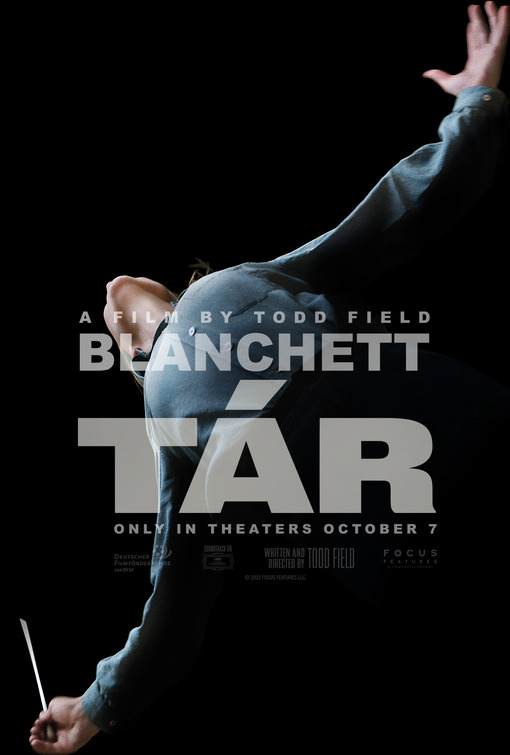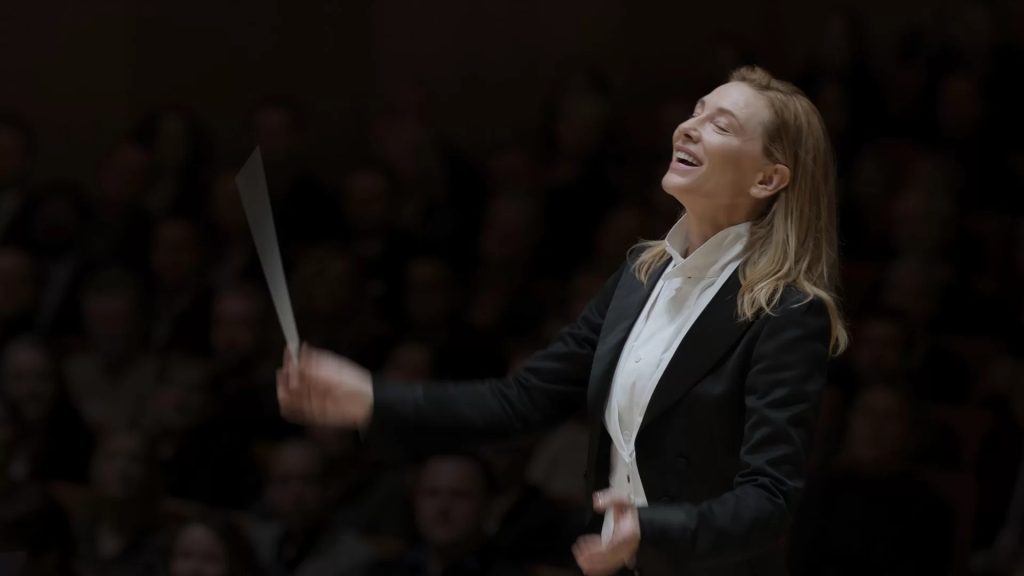
If an ordinary person — let’s say an American citizen — were asked to name a famous conductor, Leonard Bernstein would likely be the answer. Name a second, and they might struggle. Now ask for a female conductor, and you’d encounter a blank face. Orchestras can and do navigate their way through complex pieces of classical music without someone waving a baton in front of them. Yet the director of a classical performance remains a noble talent. Yes, they beat time by moving their hands up and down to the music, but they also select the score, interpret the piece, and prepare the musicians in rehearsal. Tár is a fictional profile of Lydia Tár, a captivating individual who has achieved excellence and renown in this field.
At its bare essence, Tár is the portrait of a woman, but that depiction is so thoroughly realized the film becomes a dazzling spectacle. She is an authoritarian, to be admired and hated. Watching Cate Blanchett inhabit this role is akin to an actress completely channeling a spirit. Lydia is, in fact, a protegee of Leonard Bernstein. She wields power over the Berlin Philharmonic like a massive colossus, controlling the orchestra literally and figuratively. Her angular visage, that broad forehead, and high cheekbones that converge to a pointed jawline are all the more emphasized. She is an assertive woman who barely acknowledges that she is female. Chilly, androgynous, and gifted — she is a force of nature, a talent that reached this influential position despite — or rather because of — a refusal to temper her opinion or behavior. This proves to be controversial as the story develops.
Tár is an account built upon the art of talking. It opens as she’s being interviewed onstage at Lincoln Center by a star-struck journalist, Adam Gopnik, culture writer for The New Yorker, playing himself. He rattles off her list of accomplishments that boast EGOT status – an Emmy, a Grammy, an Oscar, a Tony. She has just written a memoir, “Tár on Tár,” and the public is hungry for more information. In a dialogue that makes no editing concessions to the rules of cinema, it feels like the full unedited interview from an actual TV show. Tar is relaxed but thoughtful as she pontificates on various topics. She bristles at the idea that women conductors be referred to as Maestra, the feminized form of Maestro. “They don’t call astronauts astronettes,” she offers as she confidently smiles at her own joke. That sets the tone as interactions with other people convey a multifaced personality.
The production highlights a highly eloquent screenplay. Actor/director Todd Field (In the Bedroom) has been attached to a plethora of projects over the past 16 years but hasn’t produced anything since Little Children in 2006. He writes and directs here. Occasionally his screenplay can feel a bit unwieldy and verbose. A meeting with Eliot Kaplan (Mark Strong), an investor and less accomplished conductor, goes on far too long. I lost the subject of their conversation at one point. However, more often than not, the dialogue is thrilling. It’s good to have Todd Field back, writing and directing again.
Tár is Cate Blanchett’s movie, but her dealings with other people elucidate her character. Lydia’s romantic partner is Sharon, but actress Nina Hoss is more than “the wife.” Sharon is First Violin, so she fully understands Lydia at work and home. They have a six-year-old adopted daughter named Petra (Mila Bogojevic), who accentuates Lydia’s protective mother instincts. Olga Metkina is the attractive young cellist (British-German musician Sophie Kauer) that captures Lydia’s attention in more ways than one. Then there’s her hard-working and long-suffering assistant Francesca (Noémie Merlant), waiting in the wings so she can one day be a conductor herself. Francesca keeps secrets and supports her boss at every turn…until she doesn’t. Things start to turn after Lydia, a guest lecturer at Juilliard, disagrees with a student (Zethphan Smith-Gneist) who dismisses the Western canon of people like Beethoven and Bach. Lydia rejects his evaluation of art based on identity politics, exhibiting bold confidence to express her opinion in an environment where people, wary of social media, often mince words. This confrontation, in a manipulated form, will return to haunt her.
To call Cate Blanchett, the best actress of her generation doesn’t seem like hyperbole at this point. An impressive filmography includes Elizabeth, The Talented Mr. Ripley, The Lord of the Rings, The Aviator, Notes On A Scandal, I’m Not There, Blue Jasmine, Carol, and Thor: Ragnarok. Blanchett’s career may span genres and styles, but one thing holds. She elevates every production in which she appears. It seems crazy to say this of an actress with so many great performances, but Tár might be her most accomplished. She dominates every scene. Every so often, a performance is so mesmerizing, I can watch someone simply speak for 2 hours and 38 minutes, and I am enthralled. Cate Blanchett is that actress, and Tár is that movie.
10-13-22


2 Responses
I was a little worried about seeing a movie this long with no action, but I was completely captivated throughout. Cate Blanchett is at her best here. The way she rehearsed her bilingual orchestra in both English and German was flawless. One of her best. 4 ⭐️
I predict another Oscar nomination. That would be her eighth, I believe.